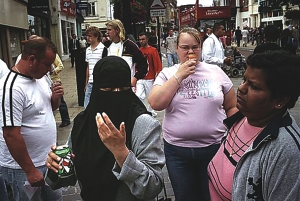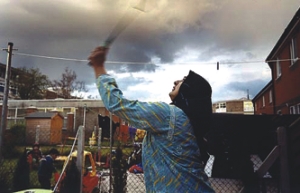|
Perspective
Islam in the British Isles
Tahiya Umrana Islam
ISLAM in the British Isles is no new phenomenon. Although the first large group of Muslims arrived in Britain around 300 years ago as sailors recruited by the East India Company, Chaucer, in the prologue to his famous work 'The Canterbury Tales' (1386), makes reference to Islamic scholars. If this early account of Islam comes as no surprise, then consider the political allegiance struck up between Sultan Murad and Queen Elizabeth I after the anti-Islamic crusades; the queen is known to have requested the assistance of the Islamic Ottoman Navy in her exploits against the Spanish Armada. This kind of political comraderie between Britain and the Muslim world appears unfathomable if one considers the current political and social climate post-9/11, and now, post-July 7th.
Traditionally British society has leant towards noting national or ethnic rather than religious divisions. For example, the way in which Muslims of Bengali or Pakistani origin are simply considered to be 'Indian' in exactly the same way that actual Indians are. The point being, that people of the sub-continent are often considered as a group from the  point of view of race or ethnicity (in this case based very much on physical appearance) rather than any religious distinctions (consider the racial tensions of earlier decades). This manner of noting divisions between people in Britain has been largely altered following the various extremist acts of terror which have lead to Islam taking centre stage in the international arena. Now, Islam provides a new way to label and divide people; those who are and those who are not Muslim. Through all levels of British society, a greater degree of attention has been focused on the specific Islamic element within the UK, which has had the effect of spawning both fear and violence as well as promoting understanding and co-operation. point of view of race or ethnicity (in this case based very much on physical appearance) rather than any religious distinctions (consider the racial tensions of earlier decades). This manner of noting divisions between people in Britain has been largely altered following the various extremist acts of terror which have lead to Islam taking centre stage in the international arena. Now, Islam provides a new way to label and divide people; those who are and those who are not Muslim. Through all levels of British society, a greater degree of attention has been focused on the specific Islamic element within the UK, which has had the effect of spawning both fear and violence as well as promoting understanding and co-operation.
One report by Leicester University found a rise in 'Islamophobia', that is, the fear and suspicion of Muslims because of their religion, rather than their ethnicity. In many ways such a finding can be understood when one considers the focus on the fanatical aspects of Islam and the negative way in which Islam has been portrayed. For example, Anjem Choudary, the British leader of al-Muhajiroun demanded that Muslim leaders should not meet with the prime minister whilst there was still a British presence in Iraq. Furthermore, there was much attention devoted to his refusal to condemn the London bombings on national radio. The fact that 88 percent of Britain's 1.8 million Muslims did condemn the atrocities of July 7th seems eclipsed by the disproportionate level of attention devoted to the minorities who are in favour of the fanatics.
This focus on the more extreme Muslims and the acts carried out by a small group of extremists has arguably led to a change in attitude towards the British Muslim community as a whole. Awareness of Islam internationally was certainly heightened post-9/11 and now following the London bombings the tensions and anxieties are closer to home. Attitudes in public and in particular on public transport were most evidently altered immediately following the July 7th attacks. Many Muslims, who were identifiable as such from their appearance, reported the hesitation with which other passengers and members of the public responded to them. For example, one man noted that several passengers on a tube carriage appeared agitated when he entered with a few bags, clearly unable to settle their anxiety, alighting at the next station, most likely in advance of their actual destination. This type of account is not at all uncommon, and given by Muslim women wearing the hijaab and men in more traditional clothing, often sporting a beard.
The change has not come only from the side of the non-Muslim British community but also from Muslims themselves. Many people, young men in particular, simply stopped carrying rucksacks or any noticeably large bags with them, and others did not wear long or baggy clothing, so as to curtail any suspicion against them. I recall the story told by one Muslim gentleman in an interview he gave to a paper, where he explained how he had made a habit of always carrying a bottle of wine with him on his way home from work, which he intended as a clear sign to all the passengers around him, I am carrying alcohol, the consumption of which is condemned by Islam and all those fanatics who claim to act in the name of Islam, I am not with them and I am no threat. Whether or not one agrees with the steps taken by this gentleman to free himself of suspicion, one thing is clear; there has been a change in attitude towards Muslims and some of those resembling the stereo type of a 'Muslim' have felt the need to change their own behaviour. claim to act in the name of Islam, I am not with them and I am no threat. Whether or not one agrees with the steps taken by this gentleman to free himself of suspicion, one thing is clear; there has been a change in attitude towards Muslims and some of those resembling the stereo type of a 'Muslim' have felt the need to change their own behaviour.
Since the terrorist acts of 9/11 and the London bombings, it is not only the British public that has changed its attitudes and behaviour but the government and local authorities have followed. In response to the new threat posed by Islamic extremists various new legislations have been put into force regarding detention and arrest procedure, and of course the much debated Anti-terrorism Act. Changes have also occurred at a more local level. One notable case is that of a young girl who was excluded from a Manchester school for insisting on wearing the jilbaab (a full length coat). The school claimed that the Muslim dress did not conform to the school uniform guidelines and was therefore not allowed, although the hijaab was permitted. More recently, Imperial College in London has sparked off controversy after it announced that, for reasons of security, the niqab (face covering )may be banned. The full covering of the face by Muslim women is considered a security problem as the individuals in such dress cannot be easily identified and makes the university more vulnerable to intruders.
It is however difficult to gauge the extent to which suspicion towards Muslims has increased. From my personal experience, I have not noticed any change in attitude, although I do not observe hijaab and am not immediately identifiable as a Muslim. The one incident that I do recall, occurred a week after the London bombings on a bus in Richmond, west London. Following a training course, myself and two colleagues (both male, both wearing beards and of south-Asian origin) embarked a public bus, carrying our bags. We received a few glances, as most new passengers do, and thought nothing of it. Once we sat down however, one gentleman continued to look over to where we were sitting and remarked 'you've got an awful of bags there...'. One colleague, being a rather bold fellow replied 'yes, and we have a bomb in every one of them'. Inappropriate retorts aside, the incident is indicative of the wider insecurity that is evident in Britain, and the gentleman on the bus was clearly perturbed by our (or rather our bags') presence.
However, there seems to be considerable effort being made in certain segments of the media to shift the focus from the fanatical and extreme elements associated with Islam and Muslims, towards a more balanced perspective. For example, the UK's Channel 4 TV station presented a 'Muslim and British' season of programmes in 2002, presumably in response to the coverage post-9/11. More recently programmes with historical foundations have been aired, focussing on the history of British Islam and Islamic architecture throughout both the Arab and greater world, as well as the significant contribution of Islamic scholars to science and philosophy. These types of documentaries and current affairs productions seem to be promoting a more balanced view of Islam, which can only be beneficial given the tensions evident.
An important, and up until more recently, a rather over looked aspect of the increase in attention towards Islam is the plight of the 'moderate' Muslims. As discussed earlier there is now the distinction between those who are and those who are not Muslim. The moderate Muslims, despite their opposition to the fanatics, are placed within the same camp as those who side with terrorism. Moderate Muslims fear the threat of terrorist acts and condemn those who carry out these acts in exactly the same way as the non-Muslim British public and yet, are still associated with the extremists. The moderates are, however, achieving a louder voice in Britain. The Muslim Council of Britain (MCB) was established in November 1997 and is the biggest attempt, to date, to give moderate Muslims a national voice. Q News, a UK based Muslim magazine, is another example of a moderate voice, whose mission statement says "Our chief interest lies in the development of a unique and relevant Western Muslim discourse". Another positive change comes in the form of moderate Imams. The traditional practice of appointing older, foreign Imams is being replaced by the admission of British born, English speaking Imams. One young Imam, in an interview, stated "This is my jihad-to give the British people a true picture of Islam, a picture of love, respect and peace".
Given that organisations and people like this do exist, the voice of the moderate Muslims should, with any luck, continue to gain force and in doing so educate as to the true nature of Islam and the majority of its followers. Let's just hope that the young Imam, with the support of the moderate Muslims, achieves his jihad.
Copyright (R) thedailystar.net 2005 |
| |
